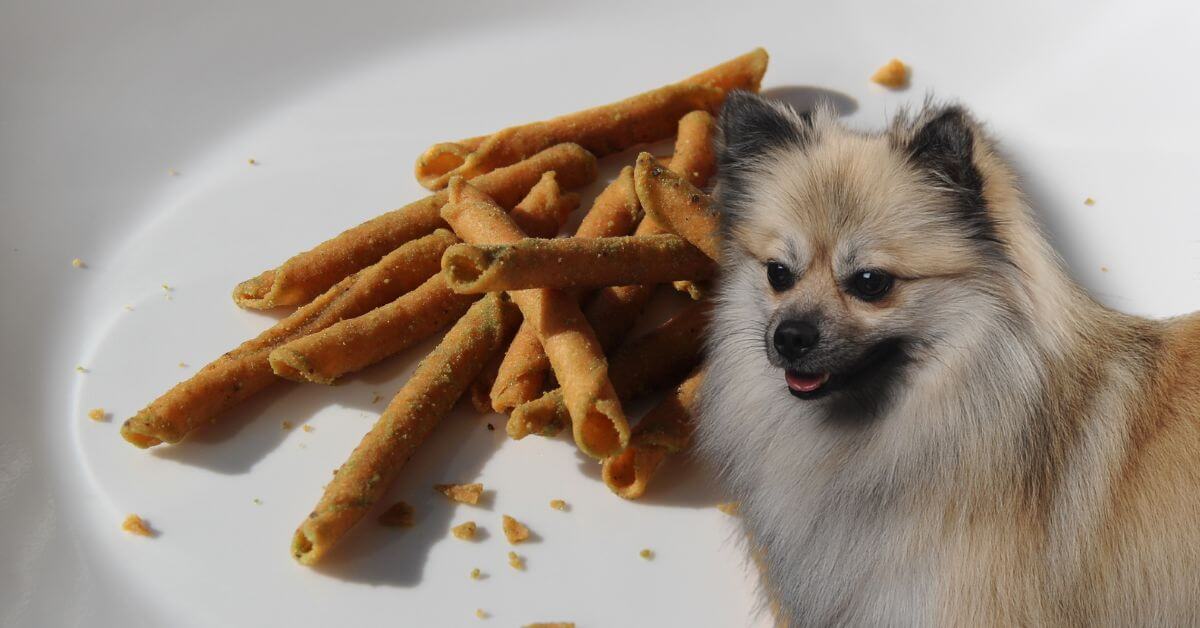Can Dogs Eat Takis? what I wish I knew
How should I put this – Takis are high in sodium, spicy, full of artificial flavors, hot, and greasy – so the answer is no, dogs absolutely cannot eat Takis.
I used to let my dog munch on snacks every now and then, but I really wish I knew how bad and unhealthy they are! Ultra-processed snacks are really not good for dogs, and you should never give your dog Takis.

- What I wish I knew about processed snacks!
- Takis Ingredients
- Corn masa flour
- Vegetable oil (palm oil, soybean oil, canola oil)
- Maltodextrin
- Salt
- Citric acid
- Sugar
- Monosodium glutamate (MSG)
- Artificial colors (Red 40 Lake, Yellow 6 Lake, Yellow 5 Lake, Blue 1 Lake)
- Hydrolyzed soybean protein
- Onion powder
- Yeast extract
- Partially hydrogenated soybean oil
- Chili pepper (Chile)
- Sodium bicarbonate
- Artificial flavor
- Disodium inosinate and disodium guanylate
- A word on artificial colors and flavors
- FAQs
Of course, this advice is for you not to give your dog Takis deliberately, but if you left a bag on the table and they ate it, the good news is that they will be fine.
You may have to help them overcome some stomach issues, but it’s highly unlikely that anything bad will happen. However, if you have a small dog and they ate a whole bag, they might have issues with garlic and onion powder, which can cause digestive issues.
What I wish I knew about processed snacks!
The first and most important thing is that takis are not toxic to dogs. Even if you have a small dog, the amount of spices and seasonings in Takis won’t cause any serious issues.
The second thing I wish I knew is how bad the sodium is for dogs! Takis are super salty, and excessive salt intake can cause sodium ion poisoning. Symptoms of sodium poisoning include vomiting, diarrhea, tremors, seizures, and even death in severe cases. The high salt content in Takis makes them a dangerous snack for dogs, and it’s best to keep them far out of reach to prevent any accidental ingestion.
Takis Ingredients
Believe it or not, these are the ingredients. Just check out the last section and all the seasonings, artificial colors, and flavors!
Corn masa flour
Vegetable oil (palm oil, soybean oil, canola oil)
Maltodextrin
Salt
Citric acid
Sugar
Monosodium glutamate (MSG)
Artificial colors (Red 40 Lake, Yellow 6 Lake, Yellow 5 Lake, Blue 1 Lake)
Hydrolyzed soybean protein
Onion powder
Yeast extract
Partially hydrogenated soybean oil
Chili pepper (Chile)
Sodium bicarbonate
Artificial flavor
Disodium inosinate and disodium guanylate
Overall, Takis contain multiple ingredients that are harmful to dogs, including high levels of sodium, artificial additives, and toxic seasonings like onion powder. It’s best to keep these snacks far away from your dog.
Ultra-processed foods, which mix these additives with high levels of unhealthy fats, sugars, and salts, offer almost no nutritional value and can contribute to obesity, diabetes, and heart disease in dogs. Feeding your dog these kinds of foods regularly can seriously impact their overall health. It’s always best to stick to natural, whole foods to keep your dog happy and healthy.
In conclusion, while a bit of salt in tortilla chips won’t hurt your dog, you should know the risks with ultra-processed snacks like Takis. We’ve debunked the myth that tiny amounts of onion and garlic powder, like what’s in Goldfish crackers, will harm dogs. But it’s still important to check what’s in these snacks. Understanding the ingredients in ultra-processed foods helps you make better choices for your dog and yourself. Always go for natural, whole foods to keep your dog happy and healthy.
Love, life, and fur forever!
FAQs
Can dogs eat blue Takis?
No, dogs should not eat blue Takis. These snacks are high in sodium, artificial colors, and spices that can be dangerous to dogs.
Can a dog eat one Taki?
While one Taki is unlikely to cause serious harm, it’s not recommended. The spices, salt, and artificial ingredients can upset your dog’s stomach.
Can dogs eat spicy chips?
Dogs should avoid spicy chips. The spices and high salt content can cause gastrointestinal issues and, in large amounts, lead to more serious health problems. Always opt for healthier, dog-safe treats.